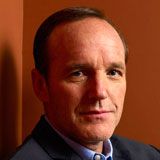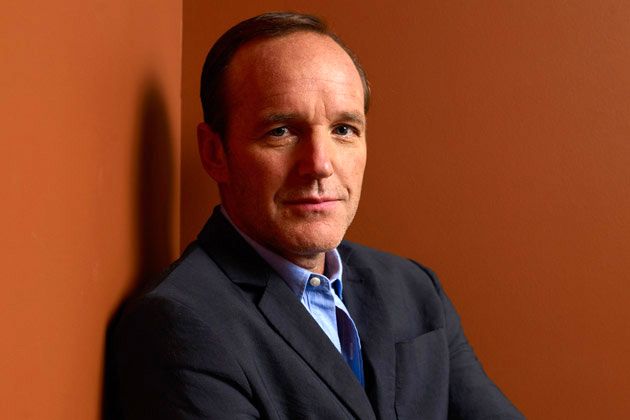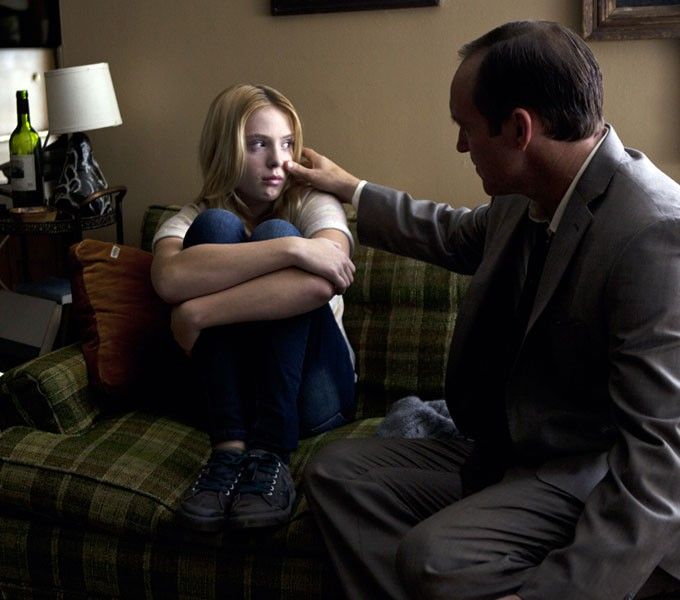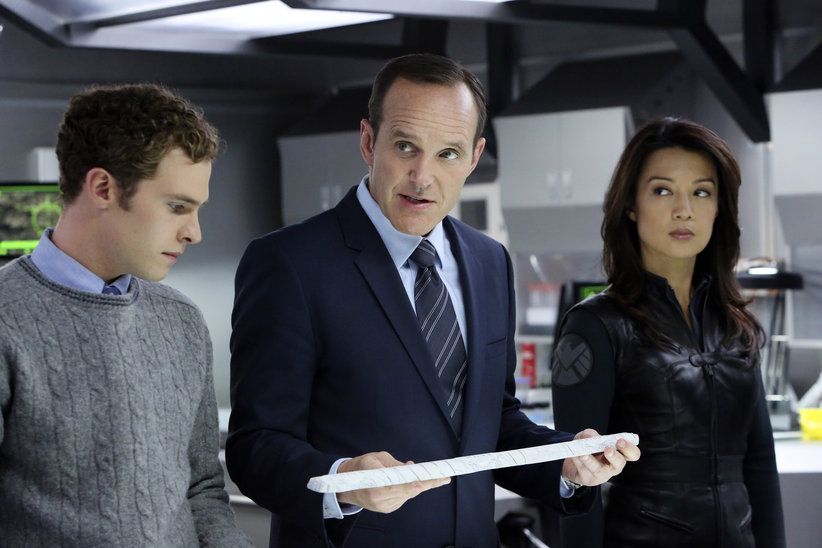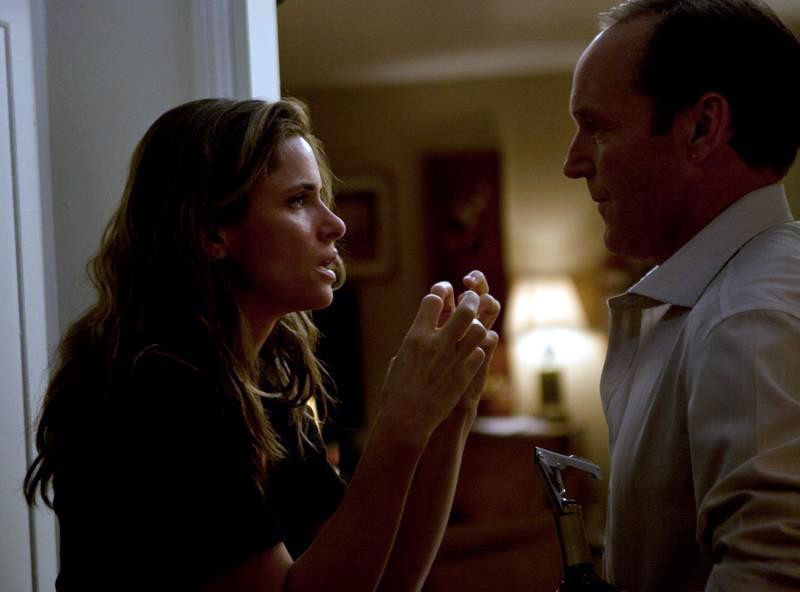Much like his alter ego Agent Phil Coulson, Clark Gregg keeps quietly and steadily racking up the big victories in his career.
An accomplished stage performer and long one of Hollywood’s go-to performers, with dozens of film and television roles to his credit, Gregg broke through to bona fide stardom as Coulson, who provided an Everyman’s view of the Marvel Cinematic Universe and ultimately elevated his supporting-player status to leading man for the TV series Marvel’s Agents of S.H.I.E.L.D. And Gregg has proved to have a skill set of equal depth: Early in his career he wrote the screenplay for the 2000 Robert Zemeckis thriller What Lies Beneath, which he followed in 2008 with his directorial debut, a well-received adaptation of the Chuck Palahniuk novel Choke.
Now, with his Coulson workload heavier than ever, Gregg had unveiled his second filmmaking effort Trust Me, a highly assured sophomore outing that takes a part-satirical, part-serious look at a particular subsection of show business. Gregg not only wrote and directed the film, he also stars in it as Howard Holloway, a former child actor barely hanging on to his business as an agent specializing in building the careers of underage performers, and desperate to find a prospect who might become the Next Big Thing. Howard stumbles upon a prime candidate in Lydia (Saxton Sharbino), a lovely young actress with the kind of white-hot talent and charisma that signifies sheer star power. However, she comes with a complicated family history that includes her wannabe manager father, whose behavior threatens to derail every advancement, and Howard suddenly faces a thorny dilemma: What if what’s best for Lydia as the budding superstar is at odds with what’s best for her as a teenager? With supporting roles filled by friends who also just happen to be some of the industry’s top talent – Allison Janney, Felicity Huffman, William H. Macy, Amanda Peet, Molly Shannon and Sam Rockwell, among them – Gregg is so assured that he even accomplishes a bit of genre-switching sleight of hand that even the most accomplished filmmaker would envy.
Gregg joined Spinoff Online at a Los Angeles restaurant for an in-depth discussion that includes his thoughts on skewering Hollywood by playing it straight, his own experiences with child-actor issues and desperation among industry players, the possibility of moving behind the camera for a Marvel project, and high art versus pop culture.
Spinoff Online: One of the things I really like about your film is that with any story set in Hollywood you can go a little broad or outrageous and get away with it. This one, though, was very grounded. You didn't have to caricature anybody. You didn't take revenge on any type of Industry personality. Every situation felt very real. Was that a very intentional choice?
Clark Gregg: It was very intentional, in that kind of broad satire, acted broadly – I don't know, I always feel a distance from it, and I wanted there to be an emotional engagement with this that I felt was only possible if it stayed within a context where everything felt pretty real. Now, there's some fantasy elements as we get more and more into this guy's head, and even those, I felt had to kind of be set in a very specific way where you realize that this is all feeling very real to him, even the script within the movie. So it's a very tricky tone to try to pull off, and I wanted it to not feel like a couple of different movies. And I knew that some people who really clung tightly to whatever the first few moments were, were going to feel thrown. And so we very carefully tried to make it feel like a whole thing and a new thing. And luckily, a lot of the response has been people powerfully feeling that the shifts are earned.
There’s a period of Hollywood filmmaking that you’ve acknowledged you love, and which you summon here – you cited Hal Ashby, Bob Rafelson and other directors from the ‘70s. Tell me a little more about your fondness for that period and what you wanted to borrow and transplant into your film.
I mean, I fell in love with movies in the same way going to Star Wars and Superman and some of the sci fi stuff that as a nerd I was really into, and then I started to kind of stay at the multiplex, and I walked into One Flew Over the Cuckoo's Nest and I was utterly blown away, and I just thought that – it still may be my most favorite movie of all time. I kind of fell in love with Nicholson and some of those movies, and then it really became a thing that I always sought out that led me to Five Easy Pieces, and that led me to The Last Detail, which I think is a brilliant movie that doesn't get enough credit – it's a tiny, perfect existential masterpiece. And then you kind of get into Being There, and that leads you to Shampoo. There was a kind of willingness to take chances and to really focus on characters, and to have this kind of very limber mix of pathos and comedy. And those were the movies that I really fell in love with where I'd be laughing at something and then kind of heartbroken a few moments later. And it's the kind of movies I love and it's the kind of movies, so far, I've tried to make. At some point, I'm sure the people who represent me, who are very wonderful and couldn't be more different than [my character, agent] Howard Holloway, would love to see me make something that's more of straight-ahead comedy or drama.
You're having a moment in your career – It's a good time to be Clark Gregg. Tell me about how you’re enjoying being in that moment and capitalizing on that momentum. Obviously with the Marvel movies being pretty instrumental in getting you there, but also trading on your established reputation in Hollywood, even prior to all of that.
I guess like anything else, you turn around one day, you've been doing something a while, it feels like, “Well, I was standing on the outside for such a long time, and then the next time people are talking about how I'd been on the inside for a while.” And I don't quite know how that happened. I guess overall, I feel doubly grateful, because I'm so grateful that this has happened at a time when I'm able to be grateful, that I've kind of lived through enough and survived enough of my own dark stuff and trials to really appreciate it. I think a lot of people have stuff that they can be grateful for, but they haven't also been given the gift of being in a place where they can experience that gratitude. And I feel really lucky to be in this moment, and I also feel really proud of the work I've done to get here. But a lot of people never get the kind of opportunities I've had. I'm just very grateful that I've gotten them at a time where I can both appreciate them and take them and do something like this. Having some success didn't lead me to start a second family and go to Vegas for three months. It led me to call my friends and use whatever capital I had to try to deepen and broaden what I'm able to do and to make something that I have more of my voice put into.
And you're getting to work in so many things that you've personally been a nerd for: the comic book world, film noir, the ‘70s era. What does it mean to you to be able to indulge in these very personal likes, but do it with the artistry that you bring in at this stage in your life?
The minute you say that, I realized I can't say another word without just throwing a giant debt of gratitude to the person I would have to call my mentor, who was David Mamet, because I walked into his class at NYU. He and the other great, generous force in my life, Bill Macy – his generosity continues: He shows up and murders a tiny scene that I thought was really instrumental in this movie. And Mamet said to me when I was a confused college person – so many wise things up to this day – but the No. 1 thing was, “Make the kind of movie that you'd like to see.” He had this syllogism based on the Golden Rule: “Be the kind of actor that you'd like to work with.” And nobody was hiring me or making the film noir that I was interested in. And whether they like it or not, this is the one that I wanted to make, and it has fantasy and emotion and weird comedy. And it's a great gift to be able to do those things, and I guess, I never could really clarify that vision without someone illuminating that in just his spectacular, kind of minimalist wisdom.
Tell me the different joys of working toward high art with a film like this and working for pop art in something like Agents of S.H.I.E.L.D. and the Marvel films and even Old Christine – something that's has pop appeal plus quality, and then trying to transcend a little bit further.
I've certainly spent my time in highbrow, like in Center Theatre, BAM Theater, I guess what people would call highbrow ends of that spectrum. But like I said, I actually grew up in love with sci fi. Blade Runner's one of my favorite movies, which blends noir and something else and talks about big ideas. The sci fi I grew up with – Ray Bradbury, Isaac Asimov, Ursula K. Le Guin – those were writers that were using this sci fi which was considered a kind of lowbrow art form to look at our present from a futurist perspective in a way that you can't do any other way. And I actually found their concepts more visionary than some of the standardly accepted highbrow stuff I was reading. So you add that to the comic books: In the Marvel Universe, Joss Whedon wrote me stuff that's as close to Shakespeare as anybody, including the people that I've been lucky enough to work with – Aaron Sorkin, David Mamet, Paul Weitz. They wrote stuff for me that's on that level, and Joss – and also the creative boundary less ness of the pop culture mythology world, I don't really see it as any lower. There's parts of it that are, but I also feel that it contains within it, that same thing I saw in that science fiction. Great question.
That said, is that a territory that you would love to say, “Hey, Kevin Feige and decision-makers at Marvel, here's my take on X character, and I've also directed a couple of films. What do you think?”
I'd be lying if I said I never thought about it just because they have such a magnificent way of taking people who have a proven skill with story and guiding them into the world of the Marvel visual effects. And one of the reasons I'm so proud to be a part of it is I feel like they've never lost their connection to the characters and to the flawed element of these superheroes. I definitely try to think of which of those properties that lay unexplored would be the one – Adam Warlock and Magus, they're so out there, that I don't think I could handle that. But yeah, I have a desire to – I kind of one-by-one check my bucket list off as an artist, and I wanted to adapt a book that I thought was funny and make a film of my own. And I did that with Choke. And I wanted to write an original script and I wanted to perhaps have some noir elements because that's what I wanted to see, and I did that. Now, there is definitely, as I think of what's next, a science fiction component in one of the two things I'm most intent on doing next. And I'm very interested in trying that next. I don't know. I was very struck by the model of True Detective, as millions of people were, that there's a way to do something in a longer form than a film and yet give it some kind of flexibility, have it be a six- to eight-hour thing on cable.
You’ve heard these cautionary tales, especially in recent years, about child actors and the things that they go through. Have you seen it, or did you just hear it? I work in Hollywood every day, too, but I don't necessarily see these things. But I hear them.
I was auditioning for a commercial many years ago. I kept myself alive doing theater and, the last couple years in New York, with a couple of commercials. And I found the process rough, and they have things called “Bite and Smile.” I had to have someone explain that to me, and it means that when you take a bite of the product, and then you smile. It was not something I was good at, but I was in doing a Bite and Smile commercial with a little kid. I walked in and there was a little kid there, and it was a cereal commercial, and we were both having a bite and smiling. And the minute we started, this kid burst into tears and said, “I don't want to audition for commercials anymore! I don't want to do this. My brother likes it – Let him do it!” And I didn't have any kids. I was so thrown by this 8-year-old saying this, and then the casting director –you know, I have to be fair, maybe they dealt with this a lot – got real kind of tough with the kid, saying, “We've been through this. You said you wanted to do this. Do you want me to get your mom in here?” And the kid was scared. And something about it really stuck with me. And it's just a departure point for my imagination, and I really cooked something up that was in my imagination, not based on any kids that I'd seen. I'd seen some moments with kids on sets that I thought weren't particularly healthy, but there was nothing to suggest anything like this. But I took it as an imaginative departure. And then I started, after I did the first draft, doing the research and looking into these kids who were stars in movies in the ‘70s. Some of the Disney movies, I would get dropped off and see them and all I wanted to be was one of those kids. I ended up going and becoming this weird, nerdy jock instead. It was not something that was available to me in the college towns I lived in or I would have pursued it, probably. And I watched the Brat Pack kids get to be in movies when they were in their early 20s and I was working in tiny garage theaters. I was on the outside looking in on that, but I started to dig into those stories, and they were so heartbreaking. Obviously, not all of them, but there were a number of kids – and we still see them every day in the headlines – who got too famous too early and couldn't make the rest of their life match up, or had too much money and too much power at a young age. God knows plenty of grown-up actors succumb to drugs and alcohol; imagine you're 15 or 16 and you have a couple hundred thousand dollars in the bank and no one watching over you? It felt to me like not an exposé, not a representative, but it did feel representative of – it felt like the white-hot core of this idea that people are so desperate to achieve this uber success that will transform their lives forever, and excuse them from working or evolving that they're willing to even the most sacred things, parenting, childhood, loyalty, and that's about a myth that they've been sold.
There's that desperation that kind of defines Howard when we meet him. Did you ever feel desperate at any point in your career? You see it a lot in the industry – you see people doing things where you just know they feel like it's their last chance, that this could be their golden ticket. Did you ever have that kind of moment?
Yeah, a lot! It's funny: Some girl I was friends with or going out with was like, “You check your phone like three times a day.” And I was like – at this point, I'd be thrilled if I checked my phone three times a day – but I said, “Yeah, there might be a phone call that will change my life.” And I realized that it was true. I've gotten phone calls that changed [everything] – that took me from unemployment check to owning a home. Just as a screenwriter or an actor, and that's crazy. That's not really good for you. I've also been in a place where I thought, “I'm getting older, I'm 40,” and great roles like Agent Coulson – anybody would have seen Iron Man 1 and bet against this guy becoming a feature part of the Marvel Universe. It's bizarre how it happened. And I was certain it wasn't going to happen. You go to an audition. You give everything, and they say, “The director wants you.” And you go, “This is it – I did it! After all these years and all these beatdowns, I kept believing in myself. I got this great film. It's going to do everything for me.” And then they call you and say, “Actually, the producers overruled him and have hired this person who's famous.” And you watch that go down a couple times, and you go, “That's it. I missed it. It's not going to happen for me.” And so I think Howard came from that, how all of us feel. Because the other thing about acting, you can't just sit down with a canvas and start doing it. I mean, I kind of did that here, but I had to get a lot of resources and experience behind me, and a certain amount of awareness about me to do it. You know, actors I know, unless someone hires them, they're a piano that no one will play, and that's tragic. And so I think we all kind of walk around with that feeling of, “Man, what happens if they take this away from me?” And there's an outsider-looking-in thing that felt very universal to me.
Tell me your hopes for the next season of Agents of S.H.I.E.L.D. You finished so strong, and the way that Coulson played out in the finale was key to its satisfaction level. So what are you looking forward to in general for Season 2?
Really, I loved what they did so much in the last couple episodes, that I just feel like they set the groundwork for such an amazing second season, in terms of suddenly he's Director Coulson. There're enough people in the fan world of this who understand what humble beginnings he came from. That's such a score for the little man. And at the same time, he's now been made head of an organization that has basically been outlawed and doesn't exist. And yet the threat is still out there, and suddenly, he's the one responsible for rebuilding this. And he's going to have to go old school, and he's going to have to go off grid. And he's going to have to go bare knuckles, and that's a very exciting place to be.
Available now on iTunes and On Demand, Trust Me opens Friday in select theaters.

